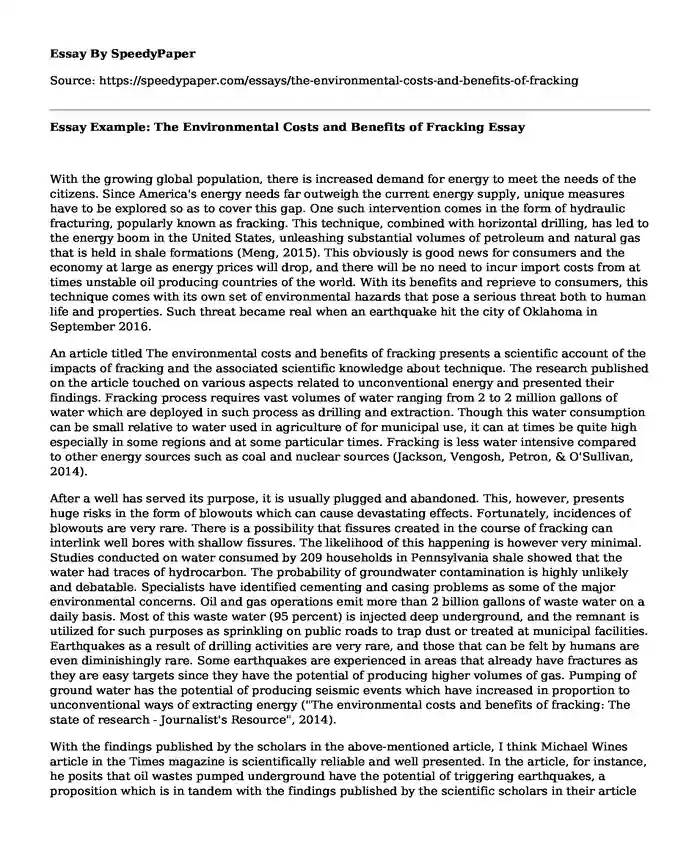
| Type of paper: | Essay |
| Categories: | Environment Energy Water |
| Pages: | 3 |
| Wordcount: | 674 words |
With the growing global population, there is increased demand for energy to meet the needs of the citizens. Since America's energy needs far outweigh the current energy supply, unique measures have to be explored so as to cover this gap. One such intervention comes in the form of hydraulic fracturing, popularly known as fracking. This technique, combined with horizontal drilling, has led to the energy boom in the United States, unleashing substantial volumes of petroleum and natural gas that is held in shale formations (Meng, 2015). This obviously is good news for consumers and the economy at large as energy prices will drop, and there will be no need to incur import costs from at times unstable oil producing countries of the world. With its benefits and reprieve to consumers, this technique comes with its own set of environmental hazards that pose a serious threat both to human life and properties. Such threat became real when an earthquake hit the city of Oklahoma in September 2016.
An article titled The environmental costs and benefits of fracking presents a scientific account of the impacts of fracking and the associated scientific knowledge about technique. The research published on the article touched on various aspects related to unconventional energy and presented their findings. Fracking process requires vast volumes of water ranging from 2 to 2 million gallons of water which are deployed in such process as drilling and extraction. Though this water consumption can be small relative to water used in agriculture of for municipal use, it can at times be quite high especially in some regions and at some particular times. Fracking is less water intensive compared to other energy sources such as coal and nuclear sources (Jackson, Vengosh, Petron, & O'Sullivan, 2014).
After a well has served its purpose, it is usually plugged and abandoned. This, however, presents huge risks in the form of blowouts which can cause devastating effects. Fortunately, incidences of blowouts are very rare. There is a possibility that fissures created in the course of fracking can interlink well bores with shallow fissures. The likelihood of this happening is however very minimal. Studies conducted on water consumed by 209 households in Pennsylvania shale showed that the water had traces of hydrocarbon. The probability of groundwater contamination is highly unlikely and debatable. Specialists have identified cementing and casing problems as some of the major environmental concerns. Oil and gas operations emit more than 2 billion gallons of waste water on a daily basis. Most of this waste water (95 percent) is injected deep underground, and the remnant is utilized for such purposes as sprinkling on public roads to trap dust or treated at municipal facilities. Earthquakes as a result of drilling activities are very rare, and those that can be felt by humans are even diminishingly rare. Some earthquakes are experienced in areas that already have fractures as they are easy targets since they have the potential of producing higher volumes of gas. Pumping of ground water has the potential of producing seismic events which have increased in proportion to unconventional ways of extracting energy ("The environmental costs and benefits of fracking: The state of research - Journalist's Resource", 2014).
With the findings published by the scholars in the above-mentioned article, I think Michael Wines article in the Times magazine is scientifically reliable and well presented. In the article, for instance, he posits that oil wastes pumped underground have the potential of triggering earthquakes, a proposition which is in tandem with the findings published by the scientific scholars in their article about fracking and its effects.
References
Jackson, R., Vengosh, A., PA(c)tron, G., & O'Sullivan, F. (2014). The Environmental Costs and Benefits of Fracking - Annual Review of Environment and Resources, 39(1):327. Annualreviews.org. Retrieved 9 September 2016, from http://www.annualreviews.org/doi/abs/10.1146/annurev-environ-031113-144051
Meng, Q. (2015). Fracking. Springer New York, 1-14. Retrieved from http://link.springer.com/referenceworkentry/10.1007/978-1-4614-6431-0_62-1
The environmental costs and benefits of fracking: TheA state of research - Journalist's Resource. (2014). Journalist's Resource. Retrieved 9 September 2016, from http://journalistsresource.org/studies/environment/energy/environmental-costs-benefits-fracking
Cite this page
Essay Example: The Environmental Costs and Benefits of Fracking. (2019, Oct 29). Retrieved from https://speedypaper.com/essays/the-environmental-costs-and-benefits-of-fracking
Request Removal
If you are the original author of this essay and no longer wish to have it published on the SpeedyPaper website, please click below to request its removal:
- Solving Personal Problem - Essay Example
- Essay Example: Philosophy of Leadership in Education
- Essay Example about the Effects of Social Media on a Student's Education
- Essay Example Describing Pro Bono Services
- Essay Sample: Children of Divorced Parents
- Essay Sample on Personal Philosophy of Nursing and Application of Nursing Theory
- Essay Sample: Creating a More Human Working Place
Popular categories




